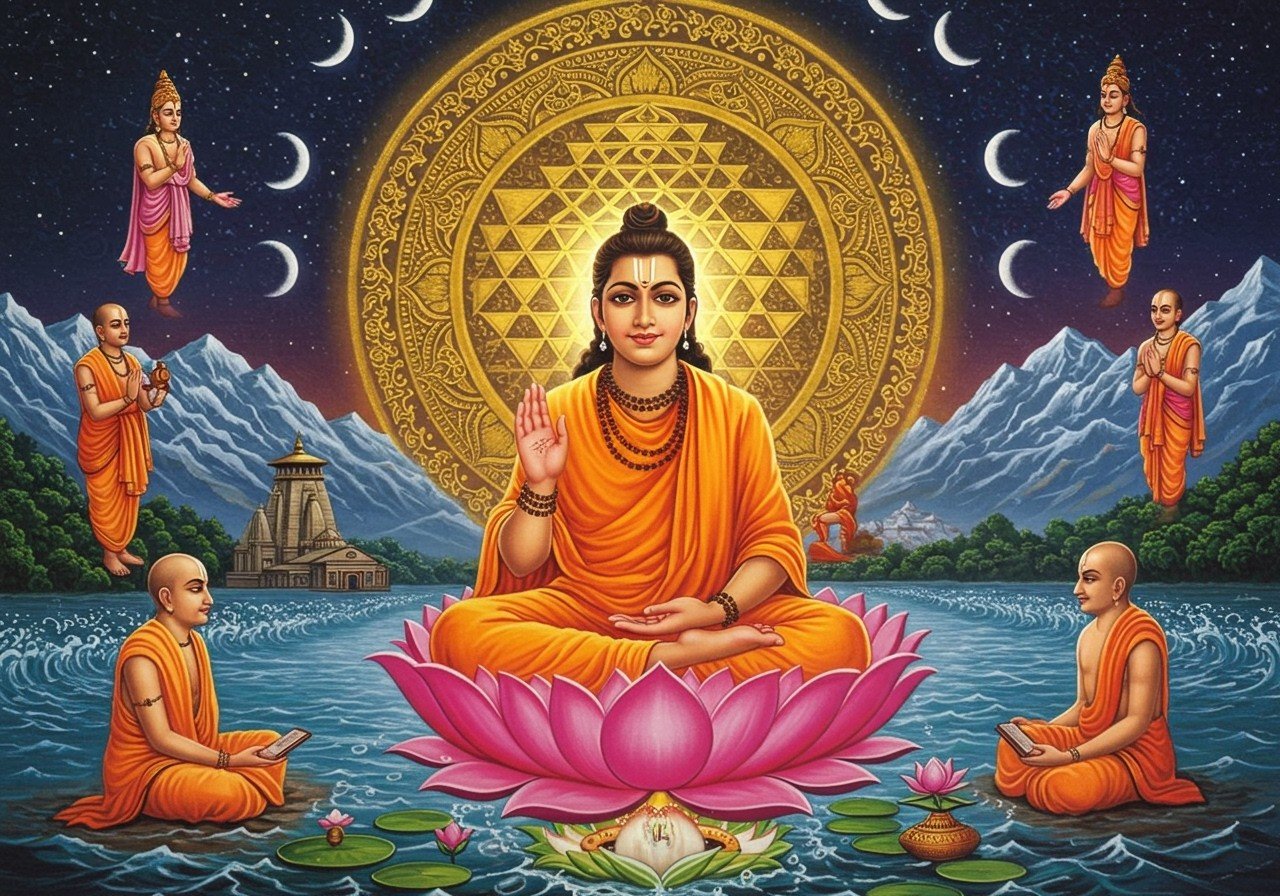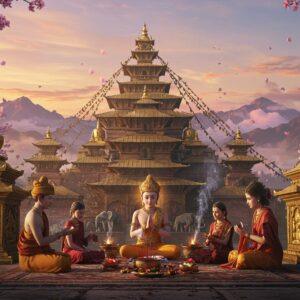
Adi Shankara (c. 788-820 AD), a revered philosopher and theologian, significantly impacted Hinduism. His teachings, grounded in Advaita Vedanta, emphasize non-dualism and continue to resonate with those seeking traditional spirituality. Born in 8th-century Kerala, India, Shankara journeyed extensively, disseminating his profound wisdom throughout the Indian subcontinent. For those seeking a deeper understanding of Hindu philosophy, we recommend exploring our beginner’s guide to Hindu philosophy.
Adi Shankara’s Literary Contributions
Adi Shankara’s writings have profoundly shaped Hindu philosophy. His commentary on the Bhagavad Gita, the Bhagavad Gita Bhasya, offers a non-dualistic interpretation of this revered text. You can find a variety of Bhagavad Gita versions at poojn.in. Shankara’s Upanishad Bhasyas delve into the intricate metaphysical concepts within major Upanishads. The Brahma Sutra Bhasya serves as a cornerstone of Advaita Vedanta, defending non-dualism against opposing viewpoints. In Vivekachudamani, a didactic poem, Shankara elucidates the path to self-realization and liberation. These texts are essential for comprehending Shankara’s influence on spiritual thought, guiding seekers toward self-realization and liberation through knowledge and wisdom.
Core Principles of Adi Shankara’s Advaita Vedanta
Adi Shankara, a prominent philosopher, offered profound insights into Hindu philosophy. His Advaita Vedanta teachings propose the oneness of reality. Shankara’s work reveals our true nature as Brahman, the ultimate, formless reality.
Brahman and Atman: The Unified Self
Shankara posits Brahman as the sole reality, teaching that the individual soul (Atman) is identical to Brahman, not separate. This concept emphasizes the vastness and infinity of our true selves, mirroring the universe.
Maya: The Illusion of Duality
Shankara describes the perceived world as Maya—an illusion that creates a false sense of separateness and duality. Maya isn’t inherently real or unreal; it simply obscures the underlying truth. Delve deeper into the concepts of Dharma and Karma with this insightful article.
Moksha: The Path to Liberation
Shankara emphasizes Moksha, liberation from the cycle of rebirth. This liberation arises from realizing the unity of Atman and Brahman. Knowledge (Jnana) and self-inquiry are crucial for dispelling ignorance and unveiling this truth.
Jnana: The Power of Knowledge
Jnana Yoga, the pursuit of knowledge, is central to Shankara’s teachings. Self-inquiry and contemplation dispel ignorance. The mantra “Aham Brahmasmi” (“I am Brahman”) encourages this realization. To enhance your meditation practice, explore our range of meditation aids at poojn.in.
Interconnectedness: Unity Within and Without
Shankara promotes unity within oneself and with the universe. His teachings harmonize knowledge (Jnana) and devotion (Bhakti) as complementary paths for spiritual growth. Discover the global reach of Hinduism and its diverse traditions at poojn.in.
Jivanmukti: Liberation in Life
Shankara introduces the concept of Jivanmukti, liberation attainable during life. This signifies the potential to experience ultimate truth and peace in the present moment.
Shankara’s work, rooted in the Upanishads, sought to reconcile diverse Hindu sects by portraying deities as varied manifestations of the one Brahman. His vision continues to inspire those seeking profound understanding and spiritual fulfillment.
Adi Shankara’s Key Philosophical Concepts
- Advaita Vedanta: This non-dualistic school of thought emphasizes the oneness of reality. It asserts that the perceived separation between the individual self and the ultimate reality is an illusion.
- Brahman and Atman: Brahman is the ultimate, formless reality, while Atman is the individual self or soul. Shankara’s philosophy equates Brahman with Atman, highlighting the inherent divinity within each individual.
- Maya (Illusion): The perceived duality and multiplicity of the world are considered Maya, an illusion. This illusion, while not entirely unreal, obscures the true nature of reality, which is non-dual.
- Liberation (Moksha): Moksha is achieved through the realization of the oneness of Atman and Brahman. This liberation is not a distant event but a present possibility, attainable through self-knowledge.
- The Role of Knowledge (Jnana): Jnana Yoga, the pursuit of knowledge through self-inquiry and contemplation, is the primary means to liberation. It removes ignorance and reveals the true nature of reality.
- Brahman as the only reality: Brahman is the sole true existence, while everything else is a manifestation of Maya, the illusion. This understanding is central to Advaita Vedanta.
- “Aham Brahmasmi”: This phrase, meaning “I am Brahman,” encapsulates the core teaching of Advaita Vedanta. It encourages individuals to recognize their inherent unity with the ultimate reality.
- Interconnectedness: Shankara’s teachings foster a sense of unity within oneself and with the entire universe. This interconnectedness stems from the understanding that all beings share the same underlying reality, Brahman.
- Harmony between knowledge and devotion: While emphasizing Jnana Yoga, Shankara acknowledged the role of devotion (Bhakti) in spiritual practice. He saw these paths as complementary, not contradictory.
- Liberation in life (Jivanmukti): Advaita Vedanta posits that liberation is not limited to an afterlife experience. Jivanmukti is the state of liberation achieved while living, characterized by wisdom, peace, and freedom from suffering.
- Self-Knowledge: Self-knowledge, the direct experience of one’s true nature as Brahman, is synonymous with liberation. It is not merely intellectual understanding but a transformative realization.
Ritual Items for Your Spiritual Journey at poojn.in
Poojn.in offers a wide selection of authentic items to support your spiritual practice, aligning with Adi Shankara’s Vedantic teachings. Discover puja essentials, worship materials, spiritual texts, and aids to deepen your connection with the divine. Start your journey today at poojn.in.
Enhance your spiritual practice with sacred threads and other ritual items available at poojn.in. We offer a wide range of products to support your spiritual journey.
For Saraswati Puja, consider our selection of clay doats and other essential puja items at poojn.in.
Embracing Shankara’s Wisdom in the Modern World
Adi Shankara’s teachings offer timeless wisdom for understanding our true nature and the universe. Realizing the oneness of Atman and Brahman brings inner peace and unity. Shankara guides us beyond illusions to embrace our true selves. His philosophy encourages the harmonious pursuit of knowledge and devotion for spiritual growth. Exploring Shankara’s wisdom unlocks profound insights, enriching life with purpose and peace. His teachings remind us that liberation is attainable in the present moment.


